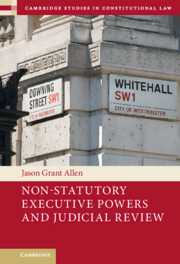Book contents
- Non-Statutory Executive Powers and Judicial Review
- Cambridge Studies in Constitutional Law
- Non-Statutory Executive Powers and Judicial Review
- Copyright page
- Dedication
- Contents
- Acknowledgements
- Table of Cases
- 1 Introduction
- 2 Official Action beyond Statute
- 3 The ‘Third Source’ in the Courts
- 4 A Unified Category of ‘Non-Statutory Executive Powers’
- 5 The Crown as Corporation
- 6 Public Law as the Law of Public Offices
- 7 Office in Action
- 8 Approaching Judicial Review
- 9 Competence, Conduct, and Validity
- 10 Moving beyond the Ultra Vires Debate
- 11 The Common Law Theory of Ultra Vires
- 12 The Borders of the Supervisory Jurisdiction
- 13 The Normative Foundations of Judicial Review
- Index
1 - Introduction
Published online by Cambridge University Press: 18 August 2022
- Non-Statutory Executive Powers and Judicial Review
- Cambridge Studies in Constitutional Law
- Non-Statutory Executive Powers and Judicial Review
- Copyright page
- Dedication
- Contents
- Acknowledgements
- Table of Cases
- 1 Introduction
- 2 Official Action beyond Statute
- 3 The ‘Third Source’ in the Courts
- 4 A Unified Category of ‘Non-Statutory Executive Powers’
- 5 The Crown as Corporation
- 6 Public Law as the Law of Public Offices
- 7 Office in Action
- 8 Approaching Judicial Review
- 9 Competence, Conduct, and Validity
- 10 Moving beyond the Ultra Vires Debate
- 11 The Common Law Theory of Ultra Vires
- 12 The Borders of the Supervisory Jurisdiction
- 13 The Normative Foundations of Judicial Review
- Index
Summary
This introductory chapter sets out the major themes of the book and presents an overview of the core arguments. A gap has emerged between theory and practice in the English law of judicial review: the review of non-statutory executive powers has been well established for decades, but the conventional theories about the conceptual basis of the supervisory jurisdiction fail to explain why this is the case. This is surprising, in the case of the so-called common law theories of judicial review, because non-statutory powers should be their home turf. However, most common law theorists have adopted a conception of official action in which 'duties of good administration' cut across an official's amorphous 'power' rather than being inherent in and thereby constraining a set of juridically defined 'powers' in the sense of vires. As for the so-called ultra vires theories, the essential connection they posit between the judges' supervisory jurisdiction and legislative intent convolutes our understanding of judicial review and misappropriates the terminology of 'ultra vires'. It is thus necessary to begin from first principles and to work through the supervisory jurisdiction over non-statutory executive powers from the ground up.
- Type
- Chapter
- Information
- Non-Statutory Executive Powers and Judicial Review , pp. 1 - 15Publisher: Cambridge University PressPrint publication year: 2022



